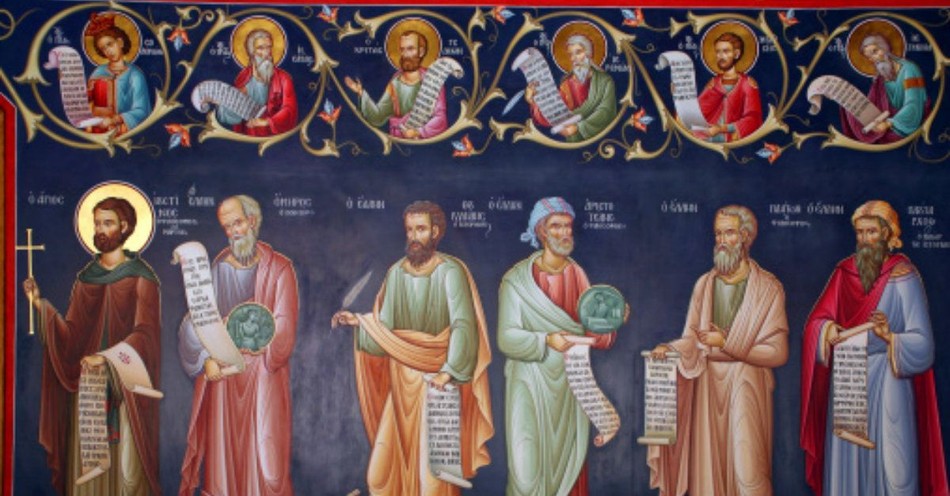“Mom, I can’t find my special bracelet. It must be lost!”
Those were my words as a six or seven-year-old, coming to my mom in distress at losing my prized golden bracelet, engraved with my name—a special gift from my godmother.
After helping me search for it, my mom suggested we pray to St. Anthony, the patron saint of lost things.
“Dear St. Anthony, please help us find this special bracelet. Amen.”
Shortly after praying, we did, indeed, find the bracelet, and thanked St. Anthony for his help.
Praying to saints, and particularly St. Anthony, was a common occurrence in my life growing up in the Catholic faith. Catholics have prayed to the saints—both canonized saints and Christian family members who have passed on—for centuries.
What may seem idolatrous and blasphemous to those who were raised in Protestant Evangelical families and churches, seems completely normal to Catholics. As someone who is no longer Catholic but who has a background in Catholicism, I can, perhaps, shed some light on why Catholics pray to saints and what the Bible actually has to say about this practice.
What Do Catholics Actually Believe about Praying to Saints?
In the Catholic view, saints—those who have died with faith in Christ—can intercede for us. Although it may seem to many Protestants that Catholics are worshipping the saints or elevating them to a level with Christ, the official Catholic doctrine says praying to the saints is not worshipping them; rather, it is about intercession. Those, like Mary, the mother of Christ, are thought to be close to Jesus and so they have a particular power to go to God on behalf of those of us who are still in the midst of our earthly struggles.
Catholics emphasize that, because departed saints belong to the Body of Christ, and that living believers are also joined to this “Communion of Saints,” the saints who are in heaven with God have power to go to God on our behalf: “Because of this membership in Christ, under his headship, the intercession of the saints cannot be a rival to Christ’s mediation; it is one with the mediation of Christ, to whom and in whom the saints form one body. (Catholic Answers).
What Does the Bible Say about Praying to Saints?
The Bible certainly does contain many passages urging—and even commanding—us to pray for one another (See the Bible Study Tools article "Bible Verses about Intercession"). The big difference between a Protestant and Catholic interpretation of these passages about intercession is that Protestants believe that “For there is one God and one mediator between God and mankind, the man Christ Jesus” (1 Tim. 2:5) and that all Christians should pray directly to him when praying for one another, and he will then intercede for us with the Father. Catholics, on the other hand, believe that Jesus intercedes for us, but that other faithful believers can do so as well.
As Mike Leake states in his Crosswalk.com article, “Why Do Catholics Pray to Mary?”: “Prayer to Mary is a way of being drawn towards Jesus. Just as a Protestant might go to a pastor to say, ‘pray for me’ with the assumption that your pastor will point you to Jesus—so also a Catholic will pray to Mary with the confidence that she will direct us to the Lord Jesus. It is an act of intercession.”
Why Is the Catholic Practice of Praying to Saints Concerning?
Concerns about praying to saints to intercede for us arise when we begin to over-emphasize the power of the saints—other humans who have faith in Christ—over Christ himself. This can potentially lead us down a slippery slope into idolatry. Just as Paul told the people in Lystra who saw him heal a lame man and attempted to worship him and Barnabas as gods, “Friends, why are you doing this? We too are only human, like you. We are bringing you good news, telling you to turn from these worthless things to the living God, who made the heavens and the earth and the sea and everything in them” (Acts 14:15), praying to other believers can draw our focus away from the incredible and intimate relationship we are offered with Jesus himself.
Through his death on the cross and his resurrection, Christ made peace for us with God (Rom. 5:1), so the question becomes: If Jesus is willing and eager for us to come to him in prayer and we have access to the Father through him, why would we spurn this privilege, this grace? Why would we content ourselves with praying to saints when we can pray to Christ himself?
Is Praying to Saints a Sin?
Was it a sin when I prayed to St. Anthony to help me find my lost bracelet? Probably not. Jesus provides abundant grace to cover a multitude of erroneous theology. If Catholics or other Christians pray to departed saints but do so in the belief that they draw us to Jesus, we can rest assured that God is big enough to use that expression of faith to work in someone’s life, even if they are seeking him in a roundabout way.
But the very good news of the Gospel is that we don’t need to seek God in a roundabout way. In his teaching on prayer, Jesus said, “If you, then, though you are evil, know how to give good gifts to your children, how much more will your Father in heaven give good gifts to those who ask him!” Praise God.
Photo credit: Salem Web Network
Veronica Olson Neffinger is a Content Editor for Salem Web Network. When she is not writing or editing articles, you can find her listening to baseball games, enjoying the outdoors, reading, or engaged in some form of home or garden care. She lives in Richmond, VA with her husband and two young sons.

.jpg)

.jpg)
